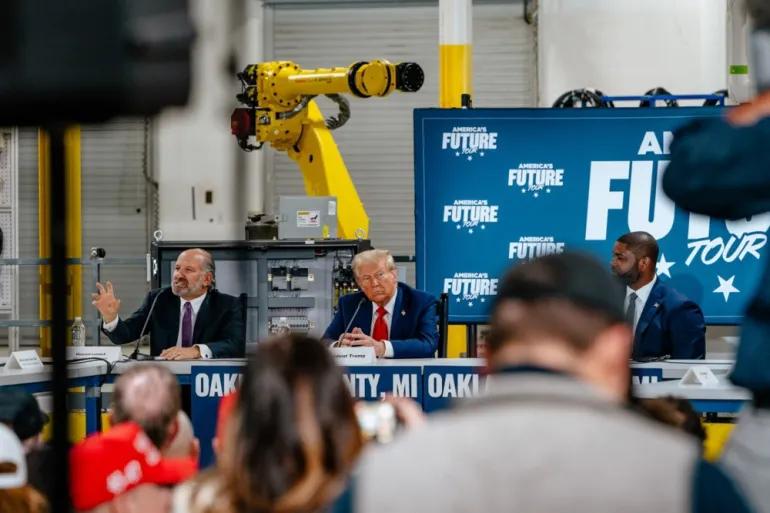
On February 1, local time, US President Trump signed an executive order to impose additional tariffs on imported goods from Mexico, Canada and China, of which small imported goods under 800 US dollars are also included in the scope of taxation, which is widely believed to be aimed at the rapid rise of Chinese e-commerce enterprises in the US market in recent years. Like Temu and SHEIN.
The Trump administration claims the policy is aimed at stopping the flow of illegal drugs like fentanyl into the United States. However, there are more complex economic and political factors behind this reason. From an economic perspective, Chinese e-commerce companies such as Temu and SHEIN take advantage of the small import tax exemption policy (De Minimis rule) to distribute goods directly from Chinese factories and warehouses to American consumers through air transportation and other means to achieve non-tax sales and obvious price advantages. Compared with the U.S. local construction of warehouses and logistics networks, they can attract consumers at lower prices and rapidly expand market share, which undoubtedly touches the interests of U.S. local e-commerce and related industries.
Former US President Joe Biden has also paid attention to the use of De Minimis rules by Chinese e-commerce companies, believing that this is a "loophole" in the tariff system and strengthening supervision. Now the Trump administration has increased again, and in addition to imposing tariffs, there may be more targeted measures in the future.
China has always adhered to the trade concept of openness, cooperation and win-win, and actively integrated into the global trading system. The expansion of Chinese e-commerce enterprises such as Temu and SHEIN in overseas markets is based on their own innovation ability, efficient supply chain and accurate grasp of consumer demand, providing global consumers with a rich variety of cost-effective goods, which is a normal market competition behavior.
This move by the Trump administration is undoubtedly the embodiment of trade protectionism, which has damaged the good trade relations that China and the United States have worked hard to build over the years, and also hindered the international development of Chinese e-commerce enterprises. This not only affects the interests of Chinese enterprises, but also makes many small and medium-sized enterprises in China's relevant industrial chain face difficulties such as reduced orders and overcapacity, which exerts certain pressure on employment and economic growth.
For other countries, too, the policy has had knock-on effects. In the context of global trade integration, the trade of countries is closely linked. As one of the largest economies in the world, the change of the trade policy of the United States will trigger the adjustment of the global trade pattern. E-commerce enterprises and related industries in other countries may also be affected, such as those countries and regions that rely on the US market and have supply chain cooperation relations with Chinese e-commerce, and their economic development may also be affected to varying degrees. Some Southeast Asian countries, which provide some raw materials and parts for Chinese e-commerce, the US tariff policy may lead to a reduction in Chinese e-commerce orders, which will affect the export trade of these countries.
The impact of this policy on China's e-commerce cannot be underestimated. According to a House Select Committee report, Temu and SHEIN send an average of 600,000 small packages a day to the United States, accounting for about 30 percent of imports under the 2022 De Minimis rule. If the presidential order is implemented, the increase in tariff costs is only one aspect, and the cumbersome customs clearance procedures will lead to the extension of distribution time, which is a very unfavorable factor for the time-focused e-commerce shopping experience, which may lead to the loss of consumers.
There is also a lot of uncertainty about the policy. The type of exemption from the De Minimis rule is unclear, which not only affects Chinese e-commerce, but also may increase the burden on U.S. companies that rely on the rule. At the same time, it remains to be seen whether the US customs department can establish an effective inspection system. If the policy cannot be implemented effectively, the expected effect of the policy will be greatly reduced. If the implementation is too strict, it may cause trade frictions, affecting the United States' own import trade and consumer interests.
In today's global trade integration, trade protectionist policies are often a double-edged sword. Although the Trump administration's move may protect the interests of local e-commerce in the United States in the short term, in the long run, it will destroy the fair and free trade environment, damage the welfare of American consumers, and is not conducive to the healthy development of global trade. Chinese e-commerce enterprises need to pay close attention to policy dynamics, actively adjust strategies, and explore new logistics and operation models, such as strengthening the construction of overseas warehouses, to meet this challenge.

Below is the English translation of the text, with precise handling of political terms, consistent sentence structures, and preservation of the original’s analytical tone and logical flow:
Below is the English translation of the text, with precise …
On December 15 local time, Trump took the British Broadcast…
In recent years, the application of artificial intelligence…
According to Yahoo US media reports, the recent remarks of …
After 11 years of waiting in the deep sea, we finally have …
On December 17, 2025, the newly renovated American "Preside…